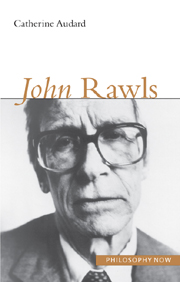Book contents
- Frontmatter
- Contents
- Acknowledgements
- Abbreviations
- Introduction
- 1 The primacy of justice
- 2 Constructing the principles of justice
- 3 Defending democratic equality: The argument from the Original Position
- 4 Pluralism and political consensus: The argument for political liberalism
- 5 A reasonable law of peoples for a real world
- Conclusion: Beyond liberalism
- Notes
- Bibliography
- Index
Introduction
- Frontmatter
- Contents
- Acknowledgements
- Abbreviations
- Introduction
- 1 The primacy of justice
- 2 Constructing the principles of justice
- 3 Defending democratic equality: The argument from the Original Position
- 4 Pluralism and political consensus: The argument for political liberalism
- 5 A reasonable law of peoples for a real world
- Conclusion: Beyond liberalism
- Notes
- Bibliography
- Index
Summary
No book of political philosophy since I read the great classics of the subject has stirred my thoughts as deeply as John Rawls' A Theory of Justice.
(H. L. A. Hart, 1975: 230)There is a wide consensus that John Rawls is one of the major thinkers of the twentieth century in the Anglophone world. His work covers and has reshaped most of the major issues of contemporary political philosophy, from constitutional law to distributive justice, from citizenshipto economic efficiency, from global ethics to religious toleration, from cultural pluralism to forms of democratic consensus, etc. Moreover, most of these topics derive from his own analysis of the relation between ethics and politics: they did not exist as such before. Most of contemporary political philosophy has been nurtured by his seminal ideas and can be understood either as a follow-upor a criticism and a reaction against them. Thus, no student or scholar of the discipline can ignore them. Still, for most of his life, Rawls lived the life of a university professor at Harvard. “An exceptionally modest and retiring man”, in the words of Ben Rogers, “he consistently refused the honours he was offered, and declined to pursue the career as public commentator opened to him by his achievements. He never wrote about himself, and virtually never gave interviews. Nevertheless, his most important book, A Theory of Justice – written during the Vietnam war – became required reading for students of philosophy, politics, economics and law all over the world, and, in that way, Rawls has influenced several generations”.
- Type
- Chapter
- Information
- John Rawls , pp. 1 - 24Publisher: Acumen PublishingPrint publication year: 2006



